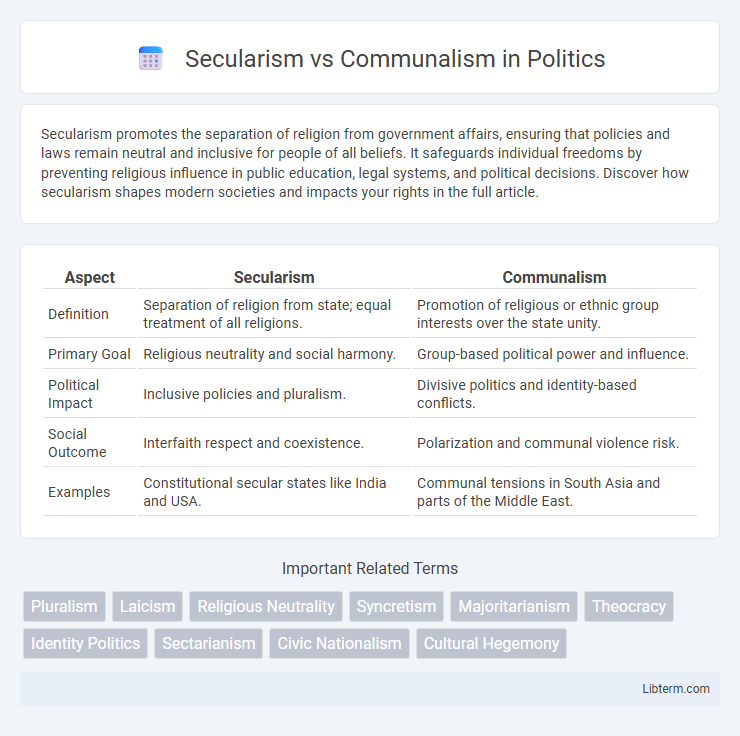Secularism promotes the separation of religion from government affairs, ensuring that policies and laws remain neutral and inclusive for people of all beliefs. It safeguards individual freedoms by preventing religious influence in public education, legal systems, and political decisions. Discover how secularism shapes modern societies and impacts your rights in the full article.
Table of Comparison
| Aspect | Secularism | Communalism |
|---|---|---|
| Definition | Separation of religion from state; equal treatment of all religions. | Promotion of religious or ethnic group interests over the state unity. |
| Primary Goal | Religious neutrality and social harmony. | Group-based political power and influence. |
| Political Impact | Inclusive policies and pluralism. | Divisive politics and identity-based conflicts. |
| Social Outcome | Interfaith respect and coexistence. | Polarization and communal violence risk. |
| Examples | Constitutional secular states like India and USA. | Communal tensions in South Asia and parts of the Middle East. |
Understanding Secularism: Principles and Meaning
Secularism embodies the principle of separating religion from state affairs, ensuring equal treatment of all religions without state endorsement or discrimination. It promotes a neutral public sphere where laws and policies are formulated based on rationality and universal human rights rather than religious doctrines. Understanding secularism involves recognizing its role in fostering social harmony, protecting minority rights, and supporting democratic governance by preventing the dominance of any single religious group.
Defining Communalism: Origins and Impact
Communalism originates from socio-political divisions based on religious or ethnic identities, often leading to conflict and polarization within diverse societies. It emphasizes loyalty to one's community over national unity, impacting social cohesion and governance. The persistence of communalism influences political rhetoric, electoral strategies, and policy-making, challenging secular democratic frameworks.
Historical Context of Secularism in Governance
Secularism in governance emerged prominently during the Enlightenment as a principle advocating the separation of religion from state affairs to ensure neutrality and protect individual freedoms. Historical precedents include the French Revolution, which challenged the Church's influence over political power, and the founding of the United States, where the Constitution established a secular government framework. This historical context highlights secularism's role in mitigating communal conflicts and promoting inclusive governance by preventing religious dominance in public policy.
The Rise and Consequences of Communalism
The rise of communalism in India has been marked by increasing religious polarization and identity-based politics, which challenges the secular framework enshrined in the Constitution. Communalism often leads to social unrest, riots, and political instability, undermining national unity and threatening democratic values. The consequences include deepening social divisions, marginalization of minority communities, and erosion of trust between different religious groups.
Key Differences Between Secularism and Communalism
Secularism emphasizes the separation of religion from state affairs, promoting equal treatment of all religious communities under the law. Communalism, on the other hand, centers around loyalty and allegiance to one's religious or ethnic group, often leading to divisions and conflicts within society. The key difference lies in secularism's goal of fostering social harmony through neutrality, whereas communalism tends to reinforce sectarian identities and social fragmentation.
Secularism in the Constitution and Law
Secularism in the Constitution of India establishes the state as neutral in religious matters, ensuring equality of all religions before the law and prohibiting discrimination based on religion. Articles 25 to 28 guarantee freedom of religion, allowing individuals to practice and propagate their beliefs without state interference. The principle of secularism promotes social harmony by upholding the rule of law and protecting religious minorities from communal biases.
Communalism and Social Division: Case Studies
Communalism often exacerbates social division by emphasizing religious or ethnic identities over national unity, leading to increased polarization and conflict. Case studies from India, such as the 1992 Babri Masjid demolition and subsequent riots, highlight how communal tensions can escalate into widespread violence and social fragmentation. In Pakistan, communalism has similarly fueled sectarian violence, destabilizing communities and hindering social cohesion across diverse groups.
The Role of Education in Promoting Secular Values
Education plays a crucial role in promoting secular values by fostering critical thinking, empathy, and respect for diversity among students. Curriculum that emphasizes constitutional principles, human rights, and the importance of coexistence helps counter communal biases and prejudices. By creating inclusive learning environments, education cultivates citizens who support religious tolerance and social harmony, which are essential to a secular society.
Challenges to Secularism in Modern Society
Challenges to secularism in modern society include the rise of communalism, which often promotes religious or ethnic group interests over national unity, leading to social fragmentation. Increasing political mobilization along communal lines undermines secular principles by fostering exclusion and discrimination against minority communities. Additionally, the politicization of religious identities hampers the implementation of secular policies, threatening social harmony and democratic values.
The Future of Secularism vs Communalism: Pathways Forward
The future of secularism versus communalism hinges on reinforcing constitutional values and promoting inclusive governance that respects religious diversity while upholding the separation of religion and state. Strengthening educational frameworks to foster critical thinking and interfaith dialogue can mitigate communal tensions and build social cohesion. Policy measures emphasizing equal rights and protection against hate speech are essential pathways to ensuring secularism thrives in pluralistic societies.
Secularism Infographic

 libterm.com
libterm.com